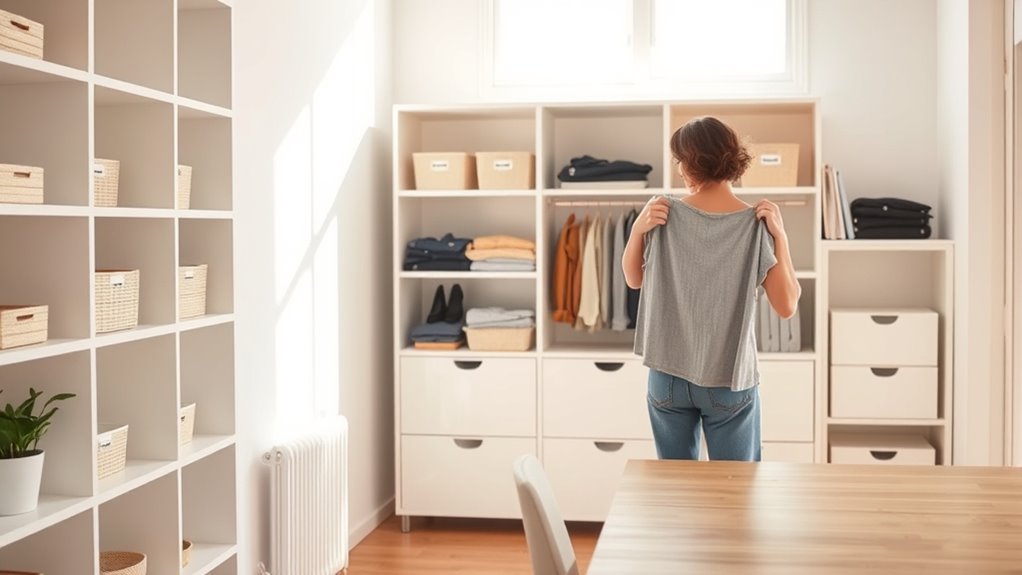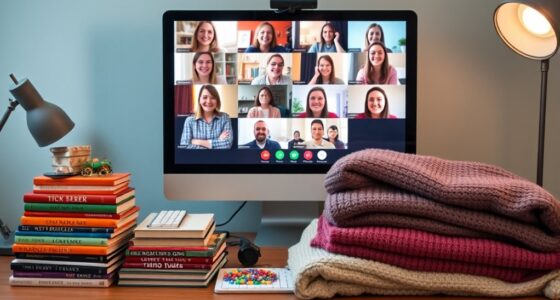The 12-12-12 decluttering challenge still works in 2025 because it provides a straightforward, manageable way to create lasting organization and mental clarity. By dedicating just a few minutes daily, you form sustainable habits and reduce visual and mental clutter. This challenge aligns with minimalist trends and helps you prioritize meaningful possessions. If you keep at it, you’ll discover simple, innovative storage ideas that support your ongoing journey toward a more peaceful, focused space.
Key Takeaways
- The 12‑12‑12 challenge promotes sustainable decluttering habits that align with the growing minimalist lifestyle in 2025.
- It simplifies the decluttering process, reducing overwhelm and encouraging consistent progress over time.
- The challenge fosters mental clarity and reduces stress by actively managing physical and mental clutter.
- Its structured approach supports the use of smart storage solutions, making ongoing organization easier.
- The challenge remains relevant by reinforcing intentional living and personal growth amidst societal shifts towards simplicity.

Starting on a decluttering challenge can transform your space and mindset, but it requires commitment and a clear plan. When you decide to tidy up, you’re not just clearing physical clutter—you’re also making room for clarity, calm, and purpose. In 2025, this approach remains effective because it taps into the desire for minimalist living, which continues to grow as people seek simplicity in a busy world. Decluttering helps you prioritize what truly matters by removing unnecessary items, allowing your environment to reflect your values and goals.
Starting a decluttering challenge transforms your space and mindset, fostering clarity, calm, and purposeful living in 2025.
One of the key aspects of a successful decluttering challenge is implementing smart storage solutions. Instead of just tossing things out, you learn to organize what you keep in ways that maximize space and accessibility. Storage solutions like multifunctional furniture, stackable bins, and hidden compartments can dramatically reduce clutter and make your space look more intentional. As you go through your belongings, think about how each item serves a purpose. If it doesn’t add value or joy, it’s time to let it go. This process encourages you to develop a minimalist mindset, where quality and utility are prioritized over quantity.
The challenge also pushes you to create systems that prevent clutter from building up again. Once you’ve pared down your possessions, you’ll want to establish routines—like a weekly tidy-up or designated spots for essentials—that reinforce your new habits. These routines help sustain your progress and keep clutter from creeping back in. Over time, you’ll notice that your living space feels more spacious, your mind more focused, and your daily routines smoother. Minimalist living isn’t just about aesthetics; it’s about cultivating a lifestyle that emphasizes intentionality and mindfulness.
Additionally, embracing minimalist living through decluttering can improve your mental health. Clutter often creates visual noise, which can lead to stress and distraction. Removing excess belongings reduces this mental clutter, making it easier to concentrate and relax. As you see your environment become more streamlined, you gain a sense of control and accomplishment. It’s a reminder that clutter isn’t just about physical space—it’s also about mental space. With consistent effort and the right storage solutions, your decluttering challenge can become a sustainable practice that enhances your overall well-being.
In 2025, the decluttering challenge remains relevant because it aligns with the ongoing societal shift toward simplicity and intentional living. By committing to this process, you’re not just tidying up—you’re creating a space that supports your lifestyle and personal growth. The journey may be challenging at first, but the rewards of a more organized, peaceful environment make it well worth the effort. With clear goals, smart storage solutions, and a minimalist mindset, you can turn your space into a sanctuary that reflects who you are and what you value most. Incorporating self-watering planters or other innovative storage ideas can also help maintain your organized environment with minimal effort.
Frequently Asked Questions
How Often Should I Repeat the Decluttering Challenge?
You should repeat the decluttering challenge every few months to reinforce habit formation and improve your time management. Regularly clearing out clutter keeps your space organized and prevents buildup. Aim for every three to four months, adjusting based on your lifestyle. Consistency helps you develop a routine, making decluttering feel natural rather than a chore. This way, you stay motivated and maintain a tidy environment without feeling overwhelmed.
Can Decluttering Improve Mental Health Long-Term?
Yes, decluttering can improve your long-term mental health. As you clear space, you create a sense of emotional release, reducing stress and anxiety. Visualizing your ideal space helps you stay motivated and focused. This process fosters a calmer mind, enhances your mood, and promotes better overall well-being. Regular decluttering keeps your environment organized, reinforcing positive habits and supporting sustained mental health benefits over time.
What Are the Best Tools for Effective Decluttering?
Imagine a messy space and a tidy one side by side—that’s the power of effective decluttering tools. You’ll want versatile storage solutions like stackable bins or closet organizers, plus digital tools like apps for digital organization. These tools help you categorize, store, and access items easily, transforming chaos into clarity. With the right combination, you stay motivated and maintain your decluttering momentum long-term, making your environment more peaceful and productive.
How Do I Stay Motivated During a Long Decluttering Process?
To stay motivated during a long decluttering process, focus on mindset shifts that emphasize progress over perfection. Break tasks into smaller, manageable steps and celebrate each victory. Find accountability partners to keep you committed and motivated, sharing your goals and updates regularly. Remember, maintaining a positive attitude and tracking your progress helps you stay inspired, making the process feel less overwhelming and more rewarding.
Is Professional Help Necessary for Large-Scale Decluttering?
If you’re facing large-scale decluttering, professional help can be a game-changer. A professional organizer offers expert decluttering services, guiding you efficiently and keeping you motivated throughout the process. You don’t have to do it alone; their experience helps you make tough decisions and stay on track. For extensive clutter, investing in professional assistance guarantees a smoother, faster, and more satisfying transformation of your space.
Conclusion
So, why does the 12-12-12 decluttering challenge still work in 2025? Because it’s simple, because it’s effective, because it keeps you focused. It’s about taking action, making progress, and feeling the freedom. It’s about clearing your space, clearing your mind, and reclaiming your time. Embrace the challenge, commit to the process, and enjoy the transformation. Because when you declutter, you create room for what truly matters—today, tomorrow, and beyond.









